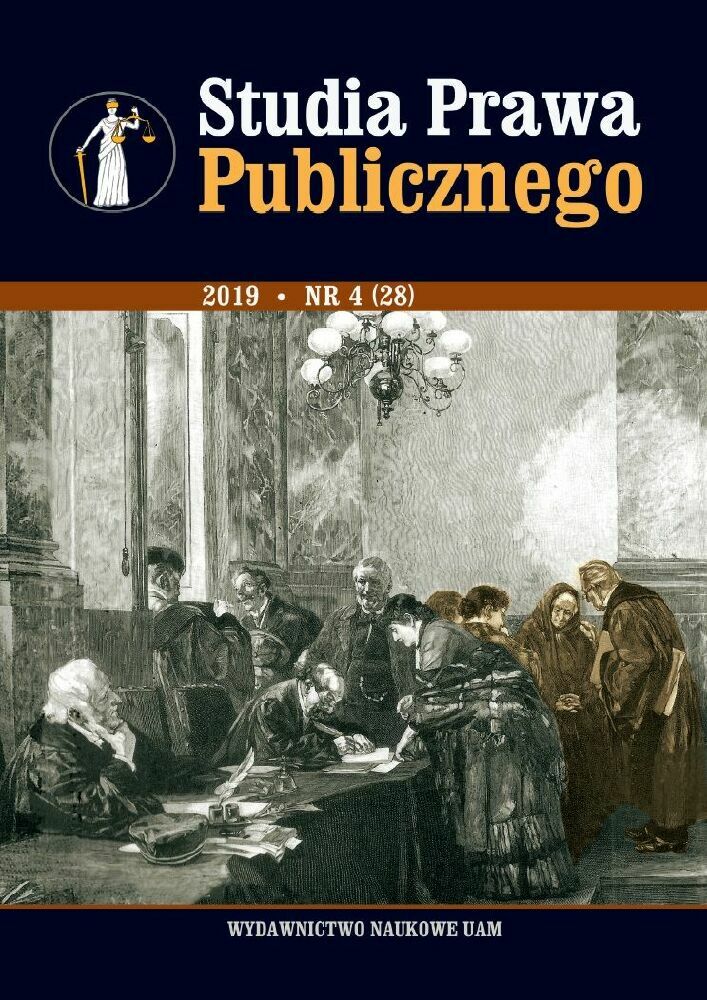Abstract
The considerations of the article focus on the planning power exercised by a municipality as a unilateral and authoritative determination of the purpose of the land and its development. The municipality in the capacity of a planning authority cannot assume an absolute and unlimited power and must act within the limits determined by applicable and binding laws. Hence, in the implementation of its land development tasks, the municipality (or local authorities) are bound by the provisions of the Constitution of the Republic of Poland and other relevant laws that govern the planning authority granted to municipalities. Exceeding the limits of this planning power will occur when planning solutions prove to be arbitrary and lack substantive justification. Defective legal solutions include not only solutions that violate the law, but also those that result from a potential abuse of the competence of the municipality. Determining the land purpose and the manner of its management must reflect a reasonable and real need for the solution adopted. When the latter is detached from the legal and factual status of the land in question, a violation of planning power arises. When a municipality adopts a local plan which introduces certain restrictions in the use of the property right that is protected in the Constitution, it is obliged to apply legal measures that will be the least onerous for individual entities and which will remain in a rational proportion to the intended purposes. However, certain situations that will lead to the conflict of interests are unavoidable. Settling these conflicts in the process of law-making requires, each time, the weighing off the interests of individual property owners and the public interest of the whole local community. Individual owners may sue the municipal planning authority on the grounds of the abuse of its planning power when adopting a local land management plan and such legal actions may be effective.
References
Bąkowski T., Ustawa o planowaniu i zagospodarowaniu przestrzennym. Komentarz, Kraków
Bielecki M., Proces inwestycyjno-budowlany – aspekty prawne, Warszawa 2016.
Chojnacka I., Władztwo planistyczne gminy w orzecznictwie sądów administracyjnych i Trybunału Konstytucyjnego „Samorząd Terytorialny” 2009, nr 1–2.
Daniel P., Naruszenie przepisów prawa własności jako źródło legitymacji do wniesienia skargi na miejscowy plan zagospodarowania przestrzennego w orzecznictwie Naczelnego Sądu Administracyjnego, „Przegląd Prawa Publicznego” 2016, n 3.
Jakimowicz W., Władztwo planistyczne gminy – kompetencje, zadania, wolności, „Administracja. Teoria – Dydaktyka – Praktyka” 2012, nr 1.
Kacznica S., Polskie prawo administracyjne. Pojęcia i instytucje zasadnicze, Poznań 1946.
Kijowski D.R., Zasada adekwatności w prawie administracyjnym, „Państwo i Prawo” 1990 z. 4.
Królczyk A., Glosa do wyroku NSA z 30.07.2010 r., II OSK 1053/10, „Casus” 2011, nr 1.
Langrod J.S., Instytucje prawa administracyjnego. Zarys części ogólnej, Kraków 2003.
Leoński Z., Szewczyk M., Podstawowe instytucje planowania przestrzennego i prawa budowlanego, Poznań 1997.
Leoński Z., Zasady prawa budowlanego i zagospodarowania przestrzennego, Bydgoszcz–Poznań 2002.
Leoński Z., M. Szewczyk, Prawo zagospodarowania przestrzeni, Warszawa 2012.
Masternak-Kubiak M., Znaczenie zasady proporcjonalności w procesie inwestycyjno-budowlanym, w: Aktualne wyzwania ochrony wolności i praw jednostki: prace uczniów i współpracowników dedykowane Profesorowi Bogusławowi Banaszakowi, pod red. M. Jabłońskiego, S. Jarosz-Żukowskiej, Wrocław 2014.
Niewiadomski Z., Planowanie przestrzenne, Warszawa 2002.
Nowicki M., Glosa do wyroku NSA z 9.02.2011 r., II OSK 238/10, „Zeszyty Naukowe Sądownictwa Administracyjnego” 2011, nr 5.
Pawłowski S., Zasada zaufania obywatela do państwa w materialnym prawie administracyjnym na przykładzie art. 98 u.g.n., w: Zasady w prawie administracyjnym. Teoria, praktyka, orzecznictwo, pod red. Z. Duniewskiej, M. Stahl, A. Krakały, Warszawa 2018.
M. Pracka, Miejscowy plan zagospodarowania przestrzennego w kontekście ograniczeń prawa własności nieruchomości, „Studia Ekonomiczne, Prawne i Administracyjne” 2015, nr 1.
Sypniewski D., Planowanie i zagospodarowanie przestrzenne, w: Nieruchomości. Zagadnienia prawne, pod red. H. Kisilowskiej, Warszawa 2009.
Zdyb M. Prawny interes jednostki w sferze materialnego prawa administracyjnego. Studium Teoretyczno-prawne, Lublin 1991.
Zieliński A., Granice władztwa planistycznego gminy w wybranych orzeczeniach sądów administracyjnych, „Przegląd Prawa Rolnego” 2011, nr 2.
Zimmermann J., Prawo administracyjne, Warszawa 2010.
License
Copyright (c) 2019 Sławomir Zwolak

This work is licensed under a Creative Commons Attribution-NonCommercial-NoDerivatives 4.0 International License.

